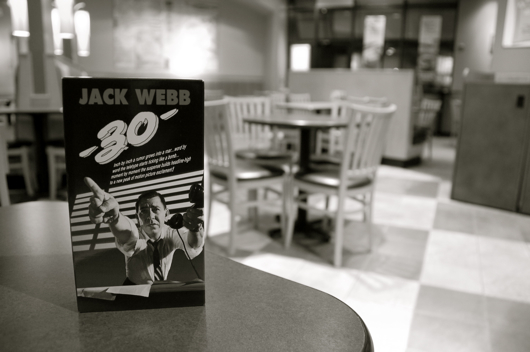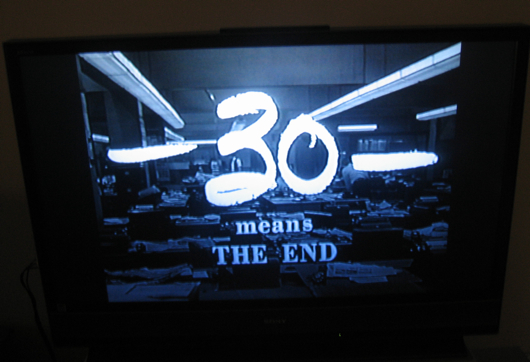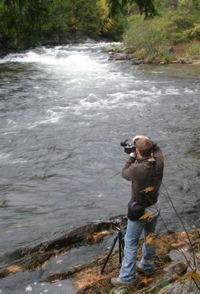
Here's what the back cover of the "-30" VHS says, in part: "In -30-, newshounds race against the clock to fill the empty pages with stories that will become as much a part of America's morning as a cup of coffee. (Jack) Webb leads the way, playing a night editor of a big-city paper. ... From 3 PM till midnight, they'll ride the adrenaline rush of dramas that shape the world and their own lives. Come next day, they'll gladly do it again. -30-"
Bob Basler, blogger over at Reuter's Oddly Enough, noticed my post about "-30-," the former sign-off code for wire copy. He sent me an e-mail, which first thanked me for linking to his blog of "news, but not the serious kind."
 "I enjoy your blog, though it's a little depressing to see -30- described as an 'old-fashion journalism tool,'" said Basler, left. "I don't dispute the description at all, but it's still depressing."
"I enjoy your blog, though it's a little depressing to see -30- described as an 'old-fashion journalism tool,'" said Basler, left. "I don't dispute the description at all, but it's still depressing."Basler has been with Reuters for about 30 years and was around when wire services actually used the code. It seems that young journalists are hardly aware of it. Fortunately, I care about history.
In a follow-up message, Basler made a suggestion.
"Some evening you should get really drunk and watch the worst newspaper movie ever, a Jack Webb drama called - 30 -," Basler said. "He plays the managing editor, if you can imagine."
Excluding the drinking portion, I decided to follow through with his recommendation. But where to find such an obscure film?
Of course, Amazon came through. For $6.63 plus $4.98 shipping and handling ($11.61), the "almost new" VHS was mine. Fortunately, I still have a VCR.
It's 97 minutes, in black and white and was released in 1959.
The film's action is confined to the newsroom. From 3 p.m. to midnight, editors bicker, laugh and cry in the process of trying to get the paper to press. They subsist on cigars, cigarettes and coffee, and derive entertainment from yelling at copy boys. "Boyyyyyaaa," the editors shout to get their attention.
It's a slow night at first: It's raining, and the best possibility for the lede photo is of a young hotty, whose likeness is peddled by a journalist-turned-modeling-agent who left newspapers for a better-paying job. The model is played by 1959's Miss Arkansas, Donna Sue Needham. The movie doesn't say whether the photo made the cut.
When a story about a missing 3-year-old girl breaks, that's when the central conflict of personal versus professional life revs into action.
The plot attempts to romanticize the world of editors, which is a tall task. To achieve that, "-30" weaves an external plot line into the journalistic action. Webb, who plays managing night editor Sam Gatlin, deflects his wife's wish to adopt a child. He's afraid he'll become too attached to the boy, just as he has become too attached to the story of the missing girl.
Interspersed with the central conflict are several typical newsroom quirks. Here are a few:
- Complaints about the shift. "I've been feeling sorry for myself, because working nights, I have to miss some of those real good TV comedy shows," one editor says.
- Inter-newsroom romance. "There isn't a man on this newspaper who could have gotten halfway to first base with me," stenographer Lady Wilson says.
- A slow news day. "Anything interesting on the wires?" Gatlin asks the wire editor. "If you think the national spelling bee in Philadelphia is interesting," the visor-wearing wire editor says.
- Distractions in the newsroom. The film periodically cuts to Carl Thompson, who is taking a couple on a tour of the building. One tour stop is in the art department, where an "artist" complains that all he does is retouch photos instead of doing real art.
- Propensity to put animals on the front page, specifically whooping cranes. "Do you know how many letters we got on the last story on them?" Gatlin says when his staff objects to the photo. "I do know that not one of them buys a paper," metro editor Jim Bathgate says about the birds.
- Annoying callers. A reader known only as Mrs. Burgess calls to ask about the crossword puzzle. "I do not know what 51 down is, and I am not being suspiciously evasive," Gatlin says. Later on, Mrs. Burgess calls the wire editor to get the phone number of the puzzle editor. Then, toward the end, she calls again. This time, Bathgate answers. "The word is concur," Bathgate says as Gatlin overhears, seemingly surprised that Bathgate knows the answer. "Yes. C-O-N-C-U-R. Concur."
- Humbleness. "We're not heroes in this business," Bathgate says. "We just write about the heroes."
- Arrogance, when Gatlin talks about whether God exists. "What would be so tough about being a power that’s greater than we are?" he says.
- An odd character, which reminds me of a FLORIDA TODAY co-worker. Bathgate is obsessed with keeping track of a certain actress and has a copy boy give him hourly updates. "She had creamed tuna fish for supper, then her boyfriend came over and gave her a pedicure," the copy boy says.
Gatlin's concern for the missing girl stems from the loss of his own wife and child in a car accident. With his current wife, the question of whether to adopt a boy weighs on him, along with the fear that the missing girl has died.
The serious plot line is lightened by the cheesy, sort of Hawaiian music, which includes bongo drums. It's a stretch considering where the story is set: Los Angeles. And the film hardly lives up to the print on the front cover of the VHS: "Moment by moment the suspense builds headline-high to a new peak of motion picture excitement!"
I won't divulge the ending in case you want to seek this film out for yourself, though I can say it's pretty cliche.
But Bob Basler was right. "-30" is the worst newspaper movie ever, or at least, it's the worst I have seen.
To best critique this film, I'll quote a Nov. 12, 1959 New York Times review: "Mr. Webb has used for his title the traditional newsman's sign-off symbol. But his picture, crammed with so much smart-alec nonsense, is rarely as authentic."

Blogger's note: Basler also is the proprietor of The Good, the Bad & the Ugly, where we journalists "hang out our dirty laundry, debate the language, showcase reader criticism of our coverage," Basler said.
-30-



1 comment:
The sort of Hawaiian music, which includes bongo drums, was coming from the copy boys who were hiding in the office of the Entertainment section, which of course was empty after 5 p.m.
Post a Comment